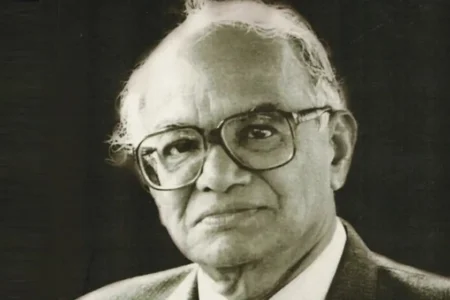In the tapestry of Southeast Asia’s political awakening, few figures shine as luminously — and as quietly — as James Joseph Puthucheary. A man of fierce intellect, unwavering moral compass, and indomitable spirit, he journeyed through turbulent times with an unshakeable commitment to justice, equality, and the empowerment of the marginalized. His story is not merely one of personal triumphs and trials but of a man who dared to dream of a freer, fairer society — and paid the price for it.
Born on 25 August 1922 in Alwaye, Kerala, India, and passing on 3 April 2000, James Puthucheary’s life spanned revolutions, occupations, and the painful birth of nations. As a lawyer, economist, trade unionist, and political pioneer, his impact reverberates through history, though his name is often whispered rather than shouted. Today, we celebrate the towering legacy of a man who lived not for accolades, but for ideals.
Early Life of James Joseph Puthucheary: Seeds of a Revolutionary Spirit
James Puthucheary was no stranger to struggle. Born to Joseph Chacko Puthucheary, a court interpreter turned police officer, and Kunyum Marthri, a devout Nasarani, James was the eldest among ten children. In 1926, the family relocated to Muar in Malaya, and later to Johor Bahru — moves that would root young James in the rich, complex soils of Southeast Asian identity.
At Johore English College, he distinguished himself not only academically but through a burgeoning consciousness of justice. The outbreak of World War II would thrust him into adulthood’s harsh realities sooner than expected.
During the Japanese Occupation of Malaya (1943–1945), James served in the Indian National Army (INA). The INA was more than just a military outfit; it was a crucible for those burning with the desire for liberation from colonialism. It was here that James first tasted the profound importance of collective action and national dignity.
Awakening at Raffles College
After the war, James Joseph Puthucheary entered Raffles College in 1948, a prestigious institution that was a beacon of learning in British Malaya. But for James, education was never an end in itself; it was a vehicle for transformation.
At Raffles, he was elected honorary general secretary of the inaugural executive committee of the student union council at the University of Malaya in Singapore. His leadership was fueled by the belief that students were not just passive recipients of knowledge but architects of a new, freer society.
James Joseph Puthucheary soon founded the Malayan Students’ Party, igniting a new wave of student activism with its central aim: to nurture Malayan civic responsibility and consciousness. Even as a student, James understood that true independence was not just the absence of colonial rulers but the awakening of a people’s sense of duty, pride, and agency.
Political Odyssey: Building Dreams and Facing Demons
James’s political star rose rapidly as he became one of the founding members of the People’s Action Party (PAP) — the party that would eventually lead Singapore to independence. Together with other luminaries, he sought to forge a multi-racial, egalitarian society.
Yet, as the years wore on, James Joseph Puthucheary found himself at odds with the PAP’s increasingly authoritarian leanings. In 1961, following ideological splits within the party, he courageously severed ties and joined the Barisan Sosialis, a leftist movement committed to democratic socialism and social justice.
His decision came at a great cost. In 1963, during the government-led sweep known as Operation Coldstore, James was detained without trial, accused of pro-communist activities — an accusation many now view with skepticism. His detention was not an indictment of guilt but a testament to his perceived threat to entrenched power structures.
After his release, James faced another crushing blow: he was banned from entering Singapore from 1966 to 1990 — a brutal exile that severed him from the very community he fought for.
A Quiet, Enduring Legacy
Banished yet unbroken, James Joseph Puthucheary continued his advocacy in Malaysia. As a lawyer and economist, he worked tirelessly to uplift the working class, advocating for policies that championed equitable development and human dignity.
Unlike many of his contemporaries who chased personal political power, James Joseph Puthucheary sought no riches, no titles. His life was a testament to quiet endurance — the kind that reshapes societies not with fanfare but with relentless, principled effort.
James Joseph Puthucheary passed away on 3 April 2000, largely unsung in the annals of public history. Yet, for those who know, James Joseph Puthucheary remains a giant — a man who gave everything for the promise of a better tomorrow.
Also Read : Veena Praveenar Singh: Redefining Beauty and Strength on the Global Stage
